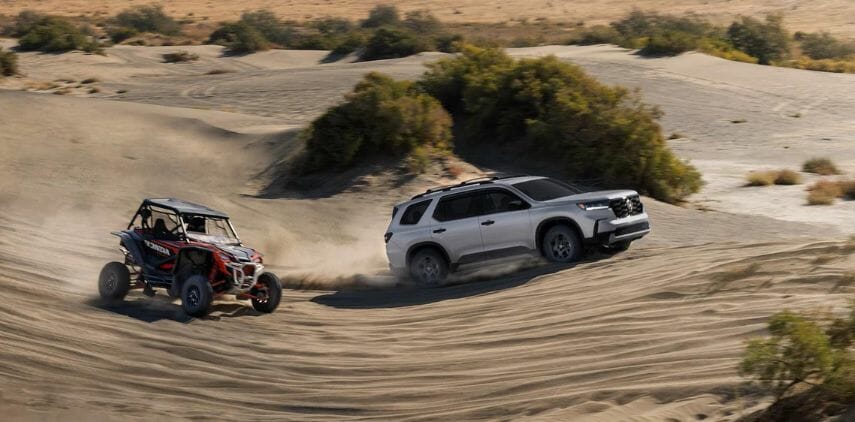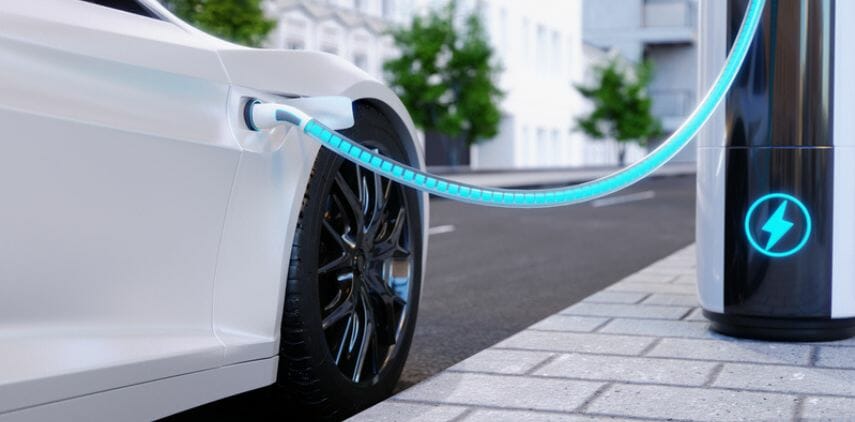Overview
In the realm of automobiles, a powerful breed stands tall and commands attention wherever it roams. A symbol of strength, versatility, and unwavering capability, the 4×4 SUV has become an iconic emblem of adventure and exploration.
But what exactly does “4×4” mean regarding these formidable machines? Brace yourself into the heart of automotive ingenuity as we delve into the captivating world of 4×4 SUVs.
We’ll uncover the secrets behind their extraordinary abilities and the engineering marvels that make them conquerors of the road less traveled.
From conquering rugged terrains to defying the laws of nature, unravel the true meaning behind the enigmatic 4×4 and discover why these four-wheeled giants reign supreme in off-road supremacy.
Table of Contents
What Does 4×4 Mean?
Simply put, the term “4×4” refers to the four-wheel drive (4WD) system found in SUVs and other off-road vehicles. This system allows all four vehicle wheels to receive power from the engine simultaneously, giving it a level of traction and capability that would otherwise be impossible to achieve with two-wheel drive vehicles.
This system comprises several components, including transfer cases, differentials, driveshafts, and axles, which all work together to ensure maximum traction and power delivery on any terrain or surface.
The 4×4 system gives drivers the confidence to tackle difficult roads and push their vehicle’s capabilities to the limit. Whether traversing rocky trails or tackling icy roads, 4×4 SUVs offer unbeatable performance and reliability in any driving situation.
Is 4×4 the Same as 4WD?

The terms “4×4” and “4WD” are often used interchangeably, but there can be slight differences in their meanings depending on context. Generally, both terms refer to the same drivetrain configuration, where power is distributed to all four wheels simultaneously. However, some variations exist:
- Technically, “4×4” refers to the vehicle’s drivetrain layout, indicating that all four wheels receive power.
- “4WD” (Four-Wheel Drive) is a broader term encompassing different systems and technologies to deliver power to all four wheels. It can include full-time or part-time systems, differentials, and transfer cases.
These terms are often used interchangeably to describe vehicles with four-wheel drive capability. The specific terminology used may vary among manufacturers and regions.
Is 4×4 Better Than AWD in the Snow?
The choice between 4×4 and AWD (All-Wheel Drive) depends on various factors, including the specific vehicle, driving conditions, and personal preferences. Here are some points to consider when comparing 4×4 and AWD in snowy conditions:
Benefits of 4×4 in the Snow:
- Enhanced off-road capabilities: 4×4 systems are typically designed to handle challenging off-road terrains, making them well-suited for snowy conditions.
- Better traction: 4×4 systems provide improved traction on slippery surfaces, such as snow-covered roads, by simultaneously sending power to all four wheels.
- Effective for uphill climbs: 4×4 systems can distribute power to the wheels with the most grip, making them advantageous when ascending snowy hills.
Benefits of AWD in the Snow:
- Increased stability: AWD systems continuously monitor traction and distribute power accordingly, enhancing stability and control on snowy roads.
- Seamless operation: AWD systems operate automatically, requiring no driver intervention. This feature can benefit less experienced drivers or those who prefer a hands-off approach.
- Suitable for mixed conditions: AWD systems perform well in various conditions, not just snow. They can provide enhanced traction on wet or icy roads as well.
Ultimately, the effectiveness of both 4×4 and AWD in the snow depends on the specific vehicle’s design, tire quality, and other factors. It is advisable to test-drive different models and consider individual preferences before deciding.
Is a 4×4 SUV Worth It?
Determining whether a 4×4 SUV is worth it depends on your needs, driving habits, and lifestyle. Here are some factors to consider when deciding if a 4×4 SUV is worth the investment:
Advantages of a 4×4 SUV:
- Off-road capabilities: If you frequently venture off-road or encounter challenging terrains, a 4×4 SUV can provide the necessary traction and capability to tackle such conditions.
- Enhanced towing capacity: 4×4 systems often contribute to increased towing capabilities, making them suitable for hauling trailers or other heavy loads.
- Peace of mind in inclement weather: A 4×4 SUV can offer improved stability and traction on slippery roads, which can be particularly valuable in regions with harsh winters or unpredictable weather conditions.
Factors to consider:
- Fuel efficiency: 4×4 systems typically add weight and complexity to the vehicle, which can result in decreased fuel efficiency compared to two-wheel drive models.
- Higher upfront cost: 4×4 SUVs are often priced higher than their two-wheel drive counterparts due to the added drivetrain components and capabilities.
- Maintenance and repair costs: The additional mechanical components of a 4×4 system may require more maintenance and potentially higher repair costs over the vehicle’s lifespan.
Ultimately, deciding whether a 4×4 SUV is worth it depends on your needs and priorities. If you frequently encounter challenging terrains or prioritize off-road capabilities and rugged weather performance, a 4×4 SUV may be a valuable investment.
What Is the Most Reliable Used 4×4 SUV?
Reliability can vary among different SUV models, but several used 4×4 SUVs have gained a reputation for their durability and dependability. Here are some examples of reliable used 4×4 SUVs:
- Toyota 4Runner: Known for its ruggedness and off-road prowess, the Toyota 4Runner has a reputation for reliability and long-term durability.
- Honda CR-V: While not as off-road capable as other SUVs, the Honda CR-V is praised for its reliability, comfortable ride, and versatile interior.
- Lexus GX: The Lexus GX combines luxury and off-road capability. It shares its platform with the Toyota 4Runner, contributing to its robust construction and reliability.
- Subaru Forester: Subaru vehicles, including the Forester, are renowned for their all-weather capabilities and long-lasting performance.
- Jeep Wrangler: The Jeep Wrangler has a devoted following thanks to its legendary off-road capability and rugged build quality.
It’s important to note that the reliability of a used SUV can also depend on factors such as previous ownership, maintenance history, and overall condition. Conducting thorough research, obtaining vehicle history reports, and having a trusted mechanic inspect the vehicle before purchasing is essential to ensure a reliable, used 4×4 SUV.
What Is the Difference Between an SUV and a 4×4?
While the terms “SUV” and “4×4” are sometimes used interchangeably, they refer to different aspects of a vehicle:
SUV (Sport Utility Vehicle):
- SUV is a broad term to describe a type of vehicle that combines elements of a passenger car and a traditional off-road vehicle.
- SUVs are designed with a higher ground clearance, a spacious interior, and the ability to carry passengers and cargo comfortably.
- SUVs can come in various drivetrain configurations, including two-wheel drive (2WD), all-wheel drive (AWD), or four-wheel drive (4WD).
4×4 (Four-Wheel Drive):
- 4×4 specifically refers to the drivetrain configuration of a vehicle where power is distributed to all four wheels simultaneously.
- A 4×4 vehicle with a four-wheel drive system can be an SUV, pickup truck, or any other vehicle type.
- While many SUVs have 4×4 systems, not all have this capability. Some SUVs are available in two-wheel drive or all-wheel drive configurations.
In summary, “SUV” refers to the vehicle type, while “4×4” denotes the drivetrain configuration.
Is 4×4 Better Than AWD?

Whether 4×4 is better than AWD depends on your needs and driving conditions. Here are some factors to consider:
Advantages of 4×4:
- Enhanced off-road capability: 4×4 systems are typically designed with more robust components and features, making them better suited for extreme off-road conditions.
- Towing capacity: 4×4 vehicles often have higher towing capacities than AWD models, thanks to their increased power distribution to all wheels.
Advantages of AWD:
- All-weather traction: AWD systems continuously monitor road conditions and distribute power to the wheels with the most traction, providing enhanced stability and control in various weather conditions.
- Fuel efficiency: AWD systems typically weigh less and are less complex than 4×4 systems, resulting in potential fuel savings.
The choice between 4×4 and AWD depends on your specific requirements. If you frequently encounter off-road situations or need higher towing capabilities, a 4×4 vehicle may be more suitable. However, an AWD vehicle may be better if you prioritize all-weather performance and fuel efficiency.
What’s the Difference Between AWD and 4×4?
While both AWD and 4×4 provide power to all four wheels, there are differences in how they operate:
All-Wheel Drive (AWD):
- AWD systems continuously monitor traction and distribute power automatically without driver intervention.
- AWD systems typically operate in two-wheel drive mode under normal conditions but can transfer power to additional wheels when slip is detected.
- AWD systems are often found in passenger cars and crossover SUVs and are designed to optimize traction on various road surfaces.
Four-Wheel Drive (4×4):
- 4×4 systems are usually driver-selectable, allowing the driver to manually engage or disengage the four-wheel drive mode.
- 4×4 systems are commonly found in trucks and SUVs designed for off-road or towing purposes.
- 4×4 systems often include low-range gearing and locking differentials to maximize traction and maneuverability in challenging off-road conditions.
In summary, AWD systems operate automatically and optimize traction for everyday driving, while 4×4 systems are manually engaged and offer the enhanced off-road capability and towing capacity.

Conclusion
When choosing a vehicle, it’s important to consider the difference between AWD and 4×4 systems. If you often drive in off-road conditions or need higher towing capabilities, a 4×4 system may suit your needs.
On the other hand, an AWD system can provide greater stability and fuel efficiency for everyday driving in various weather conditions.
Whichever drivetrain configuration you choose, consider all the available features and select the best fit for your requirements.





